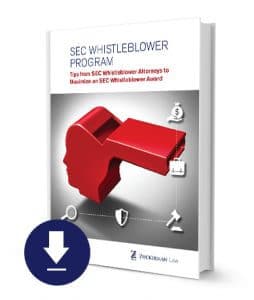In determining whether to report internally prior to reporting to the SEC, a whistleblower should consult with counsel to determine the optimal path forward that will maximize a whistleblower award while also guarding against retaliation.
To qualify for an award, most whistleblowers are not required to report internally before reporting to the SEC. (See eligibility requirements for details.) However, the SEC provides incentives for internal reporting. For example:
- If a whistleblower reports internally, and then to the SEC within 120 days of the internal disclosure, then the SEC will use the date of the internal report in determining whether the whistleblower provided “original information.” This internal reporting essentially “holds your place in line.”
- If a whistleblower’s internal disclosure prompts a company investigation, the whistleblower will benefit from all the information discovered in that investigation.
- The SEC may increase the size of a whistleblower’s award if the whistleblower participated in the company’s internal compliance systems.
 Note that the whistleblower protection provision of the Dodd-Frank Act protects only whistleblowers that have provided information to the SEC about potential securities law violations. Therefore, a disclosure that is made solely to a corporate compliance program (without also providing the information to the SEC) would not be protected under the Dodd-Frank Act. But the anti-retaliation provision of the Sarbanes-Oxley Act may protect a disclosure to a person with supervisory authority over the employee if the whistleblower is covered under SOX. See our tips to maximize your recovery in a whistleblower retaliation case.
Note that the whistleblower protection provision of the Dodd-Frank Act protects only whistleblowers that have provided information to the SEC about potential securities law violations. Therefore, a disclosure that is made solely to a corporate compliance program (without also providing the information to the SEC) would not be protected under the Dodd-Frank Act. But the anti-retaliation provision of the Sarbanes-Oxley Act may protect a disclosure to a person with supervisory authority over the employee if the whistleblower is covered under SOX. See our tips to maximize your recovery in a whistleblower retaliation case.
During FY 2021, approximately 60% of the award recipients in FY 2021 were current or former insiders of the entity about which they reported information of wrongdoing. Of those recipients, more than 75% raised their concerns internally to their supervisors, compliance personnel, or through internal reporting mechanisms, or understood that their supervisor or relevant compliance personnel knew of the violations, before reporting their information of wrongdoing to the SEC.
Click below to hear SEC whistleblower lawyer Matt Stock’s tips for SEC whistleblowers:
For more information about whistleblower rewards and bounties, contact the SEC whistleblower lawyers at Zuckerman Law at 202-262-8959.

To learn more about the SEC Whistleblower Program, download Zuckerman Law’s eBook: SEC Whistleblower Program: Tips from SEC Whistleblower Attorneys to Maximize an SEC Whistleblower Award:
 Click here to learn more about anti-retaliation protections for SEC whistleblowers under the Dodd-Frank Act and Sarbanes-Oxley Act.
Click here to learn more about anti-retaliation protections for SEC whistleblowers under the Dodd-Frank Act and Sarbanes-Oxley Act.
SEC Whistleblower Rules Encourage Internal Whistleblowing
The May 2011 SEC release (Release No. 34-64545) adopting the rules governing the SEC Whistleblower Program explains how the program incentivizes but does not require internal whistleblowing:
“As discussed above, we have built significant incentives into the whistleblower award program that we believe will encourage whistleblowers to report internally in appropriate circumstances.
In response to the proposed rules, many commenters from the corporate community argued that whistleblowers would divert from internal reporting in response to the financial incentive of a potential whistleblower award from the Commission. These commenters further argued that companies and other entities would experience significant costs as a result. Among the costs that they identified are the following: (i) Increased harm to entities and investors due to the delay in entities learning about on-going violations from the Commission rather than from internal whistleblowing; (ii) increased defense and litigation costs in responding to Commission enforcement proceedings from, among other things, nonmeritorious whistleblower complaints that could have been resolved internally; (iii) increased harm to entities and investors when non-securities law violations go unreported to the entity. These commenters did not provide us with projections or estimations regarding either the degree to which whistleblowers would likely be diverted from internal reporting under our proposed rule, or the resulting costs to companies or other entities.
Analysis of the academic literature, although not wholly conclusive, provides reason to believe that a sizable percentage of whistleblowers who currently report internally are motivated by non-monetary reasons. Thus, we anticipate that many whistleblowers would continue to report internally.
Nonetheless, we recognize that there could be a sizeable percentage of whistleblowers who, under our rules, could now be more motivated to report to the Commission in lieu of reporting internally because of the financial incentives created by the whistleblower program. In response to this possibility, we have tailored the final rules to provide whistleblowers who are otherwise predisposed to report internally, but who may also be affected by financial incentives, with additional economic incentives to continue to report internally. The final rules provide that a whistleblower who reports internally can collect a whistleblower award from the Commission if his internal report to the company or entity results in a successful covered action. In addition, the final rules provide that when determining the amount of an award, the Commission will consider as a plus-factor the whistleblower’s participation in an entity’s internal compliance procedures.
We believe these provisions should substantially reduce the degree of diversion of whistleblower reporting from companies. Assuming that some significant percentage of whistleblowers who were pre-disposed to report internally prior to the whistleblower program are inclined to change their behavior in response to financial incentives, these provisions should mitigate any diversion effect. These provisions do so by providing that an internal report can be an additional path to a whistleblower award. Indeed, to the extent that this sub-set of potential whistleblowers is responsive to economic incentives, they should be motivated to report internally by the final rules because by doing so they can increase both the probability and the magnitude of a potential recovery. Specifically, if they submit their tip internally, and either simultaneously or within 120 days make the same submission to the Commission, it is conceivable that they can increase the probability of an award because they now have two paths to a recovery—a Commission investigation, or an internal corporate investigation. They can increase the magnitude of a potential award because of the award criteria that provides a plus-factor for participation in an entity’s internal compliance procedures.
These additional financial incentives for whistleblowers to report internally should make it less likely that significant numbers of tips will be diverted from internal reporting. This in turn should mitigate companies’ costs from lost internal whistleblower reports. Moreover, while some whistleblower tips may nonetheless be diverted to the Commission, any decrease in internal reporting should be offset at least in part by the fact that our final rules will incentivize other individuals who might not have reported internally prior to the whistleblower program to do so now. The financial incentives offered by the final rules to report internally should induce individuals to report who, absent any financial incentive, would never have reported either internally or to the Commission. As a result, companies and other entities should now receive some information related to possible violations that they would not have otherwise received, which in turn may allow these entities to stop ongoing violations, thereby limiting the harm to the entities and investors sooner than might otherwise have been the case.
. . . As alternatives to the significant incentives approach that we have adopted, we considered the suggestions from commenters that we adopt some form of a mandatory internal reporting requirement as a condition on whistleblowers for award eligibility. Such an approach could take the following forms: (1) Mandatory internal pre-reporting, where the whistleblower’s eligibility would be conditioned on his first making a report internally and providing the company’s internal compliance function a meaningful period of time to respond; or (2) mandatory simultaneous reporting, under which the whistleblower’s eligibility is conditioned upon a simultaneous report to internal compliance and the Commission. We evaluated these alternatives by analyzing how whistleblowers’ expected behavior might change relative to the significant incentives approach adopted in the final rules, and what those changes might mean for the resulting costs and benefits to companies as well as the Commission’s enforcement efforts.
We believe that either a mandatory pre-reporting or a simultaneous reporting requirement would not achieve an appreciable cost-benefit advantage over the approach we are adopting, and indeed a mandatory internal reporting requirement could be less advantageous because it could result in less overall whistleblowing. With respect to those whistleblowers who are already pre-disposed to report internally, a mandatory internal reporting requirement should have little or no net difference from the significant financial incentives approach that we are adopting. To the extent that these whistleblowers respond to the financial incentives of a potential whistleblower award, we would expect them to report internally under a mandatory internal reporting requirement to be eligible for a whistleblower award from us, or to report internally under our final rules so as to seek to increase the probability and magnitude of any potential award.
The most likely difference between a mandatory regime and the significant financial incentives approach is with respect to the category of whistleblowers who, prior to the whistleblower award program, were not predisposed to report either internally or to the Commission, but who are now willing to come forward in response to a financial inducement. Within this category of whistleblowers, we believe there is some subset who would respond to the financial incentive offered by our final rules by reporting only to us, but who would not come forward either to us or to the entity if the financial incentive were coupled with a mandatory internal reporting requirement. Requiring internal reporting would have several adverse consequences: The Commission would lose critical information about some possible securities law violations, and companies and investors in turn would suffer as on-going violations remained undetected and unremedied.
Finally, we have considered the alternative of mandating that a whistleblower report internally within a specified period of time after reporting to us, unless upon reviewing the submission we direct the whistleblower not to report internally. Conceptually, this approach could allow the Commission an opportunity to review a whistleblower’s submission and direct him not to report internally in situations where, among other things, (i) we identify a basis to believe that he might in fact suffer retaliation, or (ii) there would be no benefit to reporting internally either because the entity might engage in a cover-up or the internal compliance program is ineffective. This approach could encourage some whistleblowers who might otherwise be discouraged from reporting to us under a pure mandatory reporting regime because these whistleblowers could perceive an opportunity to persuade the Commission that they should be excused from making the mandatory internal report.
Notwithstanding this potential benefit, however, we do not believe that this approach would have any significant cost-benefit advantage over the approach that we have adopted. In fact, this alternative approach would have significant disadvantages over the adopted rules. Simply put, for this approach to operate effectively and efficiently, the Commission would need to be in a position to meaningfully assess within a very short time—likely a few weeks—whether a whistleblower should be excused from reporting internally. However, the Commission is not in a position to make the necessary fact-intensive assessments identified above in a considered and reliable manner, especially within this short time frame. Moreover, this could divert limited resources from the primary objective of investigating allegations of wrongdoing.
As stated earlier, Congress did not include an internal reporting requirement in the statute, which is modeled upon the DOJ and IRS whistleblower program. Instead, Congress enacted a requirement that provides financial incentives and employment retaliation protections for reporting directly to the Commission. Internal compliance programs are valuable, and under appropriate circumstances, these rules provide financial encouragement for whistleblowers to utilize those programs. At the same time, however, internal compliance programs cannot serve as adequate substitutes for our obligation to identify and remedy violations of the Federal securities laws. In addition, there are circumstances where whistleblowers may have legitimate reasons for not wanting to report information internally, even if the company provides an avenue for anonymous reporting. For these reasons, the adopted approach encourages the whistleblower to report allegations internally, yet ultimately and appropriately leaves that decision to the whistleblower.”
Even an outsider can get credit for making an anonymous tip to a company that causes the company to open an investigation and reported the allegations to the SEC. See Release No. 96527 (December 19, 2022).
Are SEC Whistleblowers Protected Against Retaliation?
Click here to learn more about anti-retaliation protections for SEC whistleblowers under the Dodd-Frank Act and Sarbanes-Oxley Act.
Protections for SEC Whistleblowers Post-Digital Realty (11-6-2020)Does the Sarbanes-Oxley Act Protect Employees Who Report Securities Law Violations Internally?
Yes. To learn more about SOX whistleblower protection, see our guide titled Sarbanes-Oxley Whistleblower Protection: Robust Protection for Corporate Whistleblowers:
Can a SOX Whistleblower Quality for an SEC Whistleblower Award?
SEC Whistleblower Bounties for Internal Reporting
A whistleblower will satisfy Rule 21F-4(c)(3) where he/she does the following:
- reports original information through an entity’s internal whistleblower, legal or compliance procedures before or at the same time he or she reports to the Commission;
- the entity provides the Commission with the whistleblower’s information or with the results of an investigation initiated in response to the whistleblower’s information;
- the information provided by the entity to the Commission “led to” successful enforcement under the criteria of
Rule 21F-4(c)(1)4 or (2)5; and - the whistleblower provides the same information to the Commission in compliance with Rule 21F-9 within 120 days of providing it to the entity.
Note though that if the company refuses to provide the report resulting from its internal investigation and refuses to provide any witness summaries or notes compiled during the internal investigation that a whistleblower initiated, the whistleblower might not qualify for an award for their internal reporting. See Release No. 98219 (Aug. 25, 2023) (Claimant did not
submit information to the Commission within 120 days of reporting it to the Company and submitted it after the Covered Action was filed and settled, after the Notice of Covered Action was posted, and years after the Company initiated an
internal investigation).
To remain eligible for an award, most whistle-blowers do not have to report internally prior to going to the SEC. With that said, the SEC has provided certain incentives to doing this. The first and perhaps most important incentive is that by participating with your company’s internal compliance system, this supports an increase in any award percentage that you may receive. In addition, if you report internally and then to the SEC within 120 days, the SEC will consider that your report date to be the same date as your internal report date when it determines whether or not you submitted original information.










